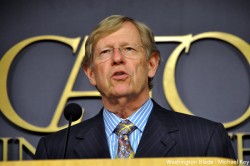National
Prop 8 opponents: Calif. civilians can’t defend case against state
Supporters of anti-gay law attempting to jump in to defend it after the state chose to stay out

Today the California Supreme Court heard oral arguments over whether or not under state law civilian supporters can take the place of the state, specifically in the Federal case challenging anti-marriage equality Proposition 8.
The hour long hearing was followed by press conferences in which both sides expressed pleasure in the outcome. The court, however, still has 90 days to come to a decision, and both opponents and supporters of Proposition 8 will be watching closely for any indication that that decision is ready.
In August of last year, Federal Court Judge Vaughn Walker found unconstitutional Proposition 8, the law barring marriage between two adults of the same sex created after a November 2008 ballot measure, ruling in favor of plaintiffs represented by the organization American Foundation for Equal Rights. The attorneys leading the charge against the law are former President Bush solicitor general Ted Olson, and former Al Gore lawyer David Boies who in 2000 faced off in Bush v. Gore. While plaintiffs are seeking to restore marriage equality to California, proponents of the measure are attempting to appeal Judge Walker’s ruling.
The 9th Circuit Federal Court of Appeals put the case, Perry v. Brown (formerly Perry v. Schwarzenegger) on hold in January after both Governor Jerry Brown and Attorney General Kamala Harris refused to defend the law in court citing their own constitutional objections. When concerned citizen groups hoping to keep the law on the books attempted to fill in for the state to defend the law, the 9th Circuit asked the California Supreme Court to rule on whether or not the concerned groups can in fact defend the law in place of the state. The legal principle at question is “standing,” which Law.com defines as “the right to file a lawsuit or file a petition under the circumstances.”
Though the 9th Circuit will make the ultimate decision, the appeals certified a question to the State Supreme Court of California on whether state law allows proponents of the ballot initiative to have the right to represent the state in the appeal in place of the state officials themselves. In February the California Supreme Court agreed to address the 9th Circuit’s question which led to today’s hearing.
If the State Supreme Court decides that the interest groups — which include a well-funded conservative website called ProtectMarriage.com — can indeed take the place of the state in defending the law, the 9th Circuit is expected to follow the guidance, allowing the case to proceed through the 9th Circuit despite the non-involvement of any agents of the state. Likewise, if the California Supreme Court decides against the proponents of Proposition 8, the 9th Circuit is expected to concur, which will end the appeals process at Judge Walker’s decision overturning the law.
The Proposition 8 ballot measure was passed in reaction to a decision by the California Supreme Court earlier in 2008 overturning the state’s ban on same-sex marriages, which allowed roughly 18,000 same-sex couples to marry in California during the short window prior to the election. The Supreme Court has since upheld those marriages as valid, though new marriages can not be recognized as a consequence of the proposition. The state also passed a law following the passage of Prop 8 that allows the state to recognize same-sex marriages performed outside of California during that same short window.
Arguing for the proponents of Prop 8, Charles Cooper argued that the interest groups would be given standing if this were a state court case, while Justices weighed whether or not the same standard ought to apply in this Federal Court matter.
Ted Olson, arguing for the plaintiffs, focused on the lack of precedent for such an intervention by an interest group, and claimed finding in favor of the Prop 8 proponents and granting their right to appeal would mean, essentially “amending” the California Constitution. He also argued that allowing Prop 8 proponents to take the place of the state in the case would set a dangerous precedent undermining the authority of the California Attorney General to make such decisions.
“Initiative proponents are elected by no one,” Olson told the justices, as reported by Adam Bink of Courage Campaign and Kate Kendell of the Center for Lesbian Rights. “Proponents took no oath to represent the people.”
When asked what the particular interest the proponents of Prop 8 had in continuing to defend the case, Charles Cooper responded to the justices, “Our interest is to protect and defend our fundamental right to propose initiatives. We have to defend that.”
In response, the justices asked “Doesn’t that right arise before the initiative is qualified?”
“This court has never recognized any distinction between before and after enactment,” Cooper responded. “That wouldn’t make any sense. What the proponents have a right to do is propose valid constitutional amendments. It is inescapable that they then have the right to defend that measure, before OR after enactment.”
However, before his time expired, Ted Olson did his best to counter Cooper’s claims.
“They sure spent a great deal of time and money, and exercised their power to ‘propose and enact.’ What they’re asking for is the power to represent themselves because of a particularized interest, which they don’t have,” Olson argued. “My understanding of California law and case law is that the legislature doesn’t have the power to defend legislation in court unless it specifically deals with the legislative power itself. There is no case, and Cooper agrees there is no case, in which the legislature has the power the proponents are claiming here. I think the initiative power is important, but the constitution of California fundamentally limits the power of the initiative and initiative proponents to exercise their right to propose and defend, that’s it.”
After the hearing, representatives from the American Foundation for Equal Rights were confident and expressed pleasure with the hearing.
“Good justices ask hard questions,” Olson said after the hearing, according to Bink and the Courage Campaign. Olson expressed pleasure with the Supreme Court justices, but emphasized he believes that no matter which direction the Supreme Court decides, the opponents of Prop 8 will prevail.
“We’re sure the US Supreme Court will agree with us,” Olson concluded.
Legal Director from Lambda Legal, Jon Davidson seemed to concur.
“It is often impossible to predict from the questions asked by appellate judges how they will rule and today was no different,” Davidson said in a statement. “All of the judges on the California Supreme Court asked probing questions and seemed concerned about the implications of any decision they might make. We continue to hope that the Court will ultimately decide that small groups of unelected individuals who are answerable to no one should not be able to act on behalf of the state.”
However, Shannon Minter legal director of the National Center for Lesbian Rights, who has argued before the California Supreme Court in favor of same-sex marriage, struck a more cautious tone when discussing her reaction to the hearing with veteran LGBT community journalist, Karen Ocamb.
“I was concerned by the tenor of many of the justices’ questions today,” Minter told Ocamb. “The court has a responsibility to enforce the California Constitution, which gives elected state officials—not private initiative sponsors—the authority to decide whether to appeal a federal court decision invalidating a state law.”
Minter continued, “Both conservative and progressive elected officials have occasionally exercised that discretion in the past by choosing not to expend state resources to defend invalidated measures. Permitting special interest groups to usurp that decision-making authority would dramatically change the current law and take a giant step down the road of turning California into a mobocracy.”
Minter expressed concern that a decision in favor of the Prop 8 proponents could have far reaching effects, going beyond just LGBT issues.
“I was disappointed that, with some notable exceptions, too many of the court’s questions today did not address the specific legal questions before them, but rather seemed to glorify the initiative process in the abstract and to abdicate a searching examination of the California Constitution in favor of emotional appeals to ‘the people.’ The initiative process is already frequently misused to target vulnerable groups, due in part to the Court’s past reluctance to enforce any meaningful limits on the process, even when those limits are mandated by the California Constitution,” Minter concluded.
“I sincerely hope the Court does not compound that mistake by now giving initiative proponents an unprecedented new power to step outside of their proper legislative role and usurp the power that our Constitution gives only to elected state officials in the executive branch.”
State Department
State Department releases annual human rights report
Antony Blinken reiterates criticism of Uganda’s Anti-Homosexuality Act

Secretary of State Antony Blinken on Monday once again reiterated his criticism of Uganda’s Anti-Homosexuality Act upon release of the State Department’s annual human rights report.
“This year’s report also captures human rights abuses against members of vulnerable communities,” he told reporters. “In Afghanistan, the Taliban have limited work opportunities for women, shuttered institutions found educating girls, and increasing floggings for women and men accused of, quote, ‘immoral behavior,’ end quote. Uganda passed a draconian and discriminatory Anti-Homosexuality Act, threatening LGBTQI+ individuals with life imprisonment, even death, simply for being with the person they loved.”
Ugandan President Yoweri Museveni last May signed the law, which contains a death penalty provision for “aggravated homosexuality.”
The U.S. subsequently imposed visa restrictions on Ugandan officials and removed the country from a program that allows sub-Saharan African countries to trade duty-free with the U.S. The World Bank Group also announced the suspension of new loans to Uganda.
Uganda’s Constitutional Court earlier this month refused to “nullify the Anti-Homosexuality Act in its totality.” More than a dozen Ugandan LGBTQ activists have appealed the ruling.
Clare Byarugaba of Chapter Four Uganda, a Ugandan LGBTQ rights group, on Monday met with National Security Council Chief-of-Staff Curtis Ried. Jay Gilliam, the senior LGBTQI+ coordinator for the U.S. Agency for International Development, in February traveled to Uganda and met with LGBTQ activists who discussed the Anti-Homosexuality Act’s impact.
“LGBTQI+ activists reported police arrested numerous individuals on the basis of their sexual orientation or gender identity and subjected many to forced anal exams, a medically discredited practice with no evidentiary value that was considered a form of cruel, inhuman, and degrading treatment and could amount to torture,” reads the human rights report.
The report, among other things, also notes Ugandan human rights activists “reported numerous instances of state and non-state actor violence and harassment against LGBTQI+ persons and noted authorities did not adequately investigate the cases.”
Report highlights anti-LGBTQ crackdowns in Ghana, Hungary, Russia
Ghanaian lawmakers on Feb. 28 approved the Promotion of Proper Human Sexual Rights and Ghanaian Family Values Bill. The country’s president, Nana Akufo-Addo, has said he will not sign the measure until the Ghanaian Supreme Court rules on whether it is constitutional or not.
The human rights report notes “laws criminalizing consensual same-sex sexual conduct between adults” and “crimes involving violence or threats of violence targeting lesbian, gay, bisexual, transgender, queer or intersex persons” are among the “significant human rights issues” in Ghana.
The report documents Hungarian Prime Minister Viktor Orbán and members of his right-wing Fidesz party’s continued rhetoric against “gender ideology.” It also notes Russia’s ongoing crackdown against LGBTQ people that includes reports of “state actors committed violence against LGBTQI+ individuals based on their sexual orientation or gender identity, particularly in Chechnya.”
The report specifically notes Russian President Vladimir Putin on July 24 signed a law that bans “legal gender recognition, medical interventions aimed at changing the sex of a person, and gender-affirming care.” It also points out Papua New Guinea is among the countries in which consensual same-sex sexual relations remain criminalized.

The Cook Islands and Mauritius in decriminalized homosexuality in 2023.
The report notes the Namibia Supreme Court last May ruled the country must recognize same-sex marriages legally performed outside the country. The report also highlights the Indian Supreme Court’s ruling against marriage equality that it issued last October. (It later announced it would consider an appeal of the decision.)
Congress requires the State Department to release a human rights report each year.
The Biden-Harris administration in 2021 released a memorandum that committed the U.S. to promoting LGBTQ+ and intersex rights abroad.
The full report can be read here.
National
Same-sex couples vulnerable to adverse effects of climate change
Williams Institute report based on Census, federal agencies

A new report by the Williams Institute at the UCLA School of Law finds that same-sex couples are at greater risk of experiencing the adverse effects of climate change compared to different-sex couples.
LGBTQ people in same-sex couple households disproportionately live in coastal areas and cities and areas with poorer infrastructure and less access to resources, making them more vulnerable to climate hazards.
Using U.S. Census data and climate risk assessment data from NASA and the Federal Emergency Management Agency, researchers conducted a geographic analysis to assess the climate risk impacting same-sex couples. NASA’s risk assessment focuses on changes to meteorological patterns, infrastructure and built environment, and the presence of at-risk populations. FEMA’s assessment focuses on changes in the occurrence of severe weather events, accounting for at-risk populations, the availability of services, and access to resources.
Results show counties with a higher proportion of same-sex couples are, on average, at increased risk from environmental, infrastructure, and social vulnerabilities due to climate change.
“Given the disparate impact of climate change on LGBTQ populations, climate change policies, including disaster preparedness, response, and recovery plans, must address the specific needs and vulnerabilities facing LGBTQ people,” said study co-author Ari Shaw, senior fellow and director of international programs at the Williams Institute. “Policies should focus on mitigating discriminatory housing and urban development practices, making shelters safe spaces for LGBT people, and ensuring that relief aid reaches displaced LGBTQ individuals and families.”
“Factors underlying the geographic vulnerability are crucial to understanding why same-sex couples are threatened by climate change and whether the findings in our study apply to the broader LGBTQ population,” said study co-author Lindsay Mahowald, research data analyst at the Williams Institute. “More research is needed to examine how disparities in housing, employment, and health care among LGBT people compound the geographic vulnerabilities to climate change.”
Read the report
Federal Government
Lambda Legal praises Biden-Harris administration’s finalized Title IX regulations
New rules to take effect Aug. 1

The Biden-Harris administration’s revised Title IX policy “protects LGBTQ+ students from discrimination and other abuse,” Lambda Legal said in a statement praising the U.S. Department of Education’s issuance of the final rule on Friday.
Slated to take effect on Aug. 1, the new regulations constitute an expansion of the 1972 Title IX civil rights law, which prohibits sex-based discrimination in education programs that receive federal funding.
Pursuant to the U.S. Supreme Court’s ruling in the landmark 2020 Bostock v. Clayton County case, the department’s revised policy clarifies that discrimination on the basis of sexual orientation and gender identity constitutes sex-based discrimination as defined under the law.
“These regulations make it crystal clear that everyone can access schools that are safe, welcoming and that respect their rights,” Education Secretary Miguel Cardona said during a call with reporters on Thursday.
While the new rule does not provide guidance on whether schools must allow transgender students to play on sports teams corresponding with their gender identity to comply with Title IX, the question is addressed in a separate rule proposed by the agency in April.
The administration’s new policy also reverses some Trump-era Title IX rules governing how schools must respond to reports of sexual harassment and sexual assault, which were widely seen as imbalanced in favor of the accused.
Jennifer Klein, the director of the White House Gender Policy Council, said during Thursday’s call that the department sought to strike a balance with respect to these issues, “reaffirming our longstanding commitment to fundamental fairness.”
“We applaud the Biden administration’s action to rescind the legally unsound, cruel, and dangerous sexual harassment and assault rule of the previous administration,” Lambda Legal Nonbinary and Transgender Rights Project Director Sasha Buchert said in the group’s statement on Friday.
“Today’s rule instead appropriately underscores that Title IX’s civil rights protections clearly cover LGBTQ+ students, as well as survivors and pregnant and parenting students across race and gender identity,” she said. “Schools must be places where students can learn and thrive free of harassment, discrimination, and other abuse.”
-

 District of Columbia5 days ago
District of Columbia5 days agoNew D.C. LGBTQ+ bar Crush set to open April 19
-

 South America3 days ago
South America3 days agoDaniel Zamudio murderer’s parole request denied
-

 Maryland4 days ago
Maryland4 days agoMontgomery County police chief discusses arrest of trans student charged with planned school shooting
-

 Movies5 days ago
Movies5 days agoAfter 25 years, a forgotten queer classic reemerges in 4K glory












